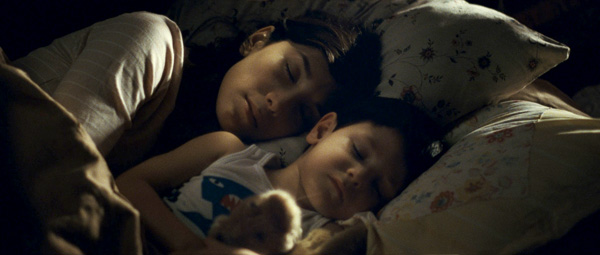|
Reviews of Recent Independent, Foreign, & Documentary Films in Theaters and DVD/Home Video

WHEN WE LEAVE
The significant population of Turkish immigrants inside Germany creates a culture clash of tectonic proportions and a fascinating subject for a film. In this simple but arresting film, Umay, a 25-year-old mother living in Istanbul, absconds with her young son and returns to her family in Berlin. At first, she answers her parents’ questions with silence, but eventually she explains in no uncertain terms that she left an abusive husband and a joyless existence. But Umay’s parents aren’t scandalized by her husband’s transgressions. “The hand that hits is also the hand that soothes,” her father (Settar Tanriogen) tells her. Instead, he condemns her shameful decision to leave her husband, reminding her, “You belong to him now.” Her father demands that she send her son back to Turkey, and when Umay refuses, she overhears him arranging to kidnap the boy the next morning. Locked in the apartment like a prisoner, she has little choice but to call the police and flee in the middle of the night under their protection. Appalled by these unheard of liberties taken by his daughter, her father stamps her out of his life and must decide how to absolve himself of the shame she’s caused. The family’s struggle between loving acceptance and harsh reprisal makes their decision to choose honor over their daughter even more devastating simply because of the glimmer of hope that love and enlightenment will prevail. Both her mother (Derya Alabora), who sees Umay’s bruises and cares deeply for the girl, and her brothers and sisters, who should have been softened by the liberal German values swirling around them, feel they have no choice but to follow their father’s decree. Umay answers her family’s edict with tears, silence, and disbelief. While she understands the cultural script guiding her parents actions, she can’t accept that they could ever do that to her. Kekilli plays Umay with slow, softened gestures, as if fatigued from a lifetime of submission, but her eyes flicker with rage. Like a loyal dog, Umay relentlessly returns to her home again and again, despite the slammed doors and unanswered phone calls. For a Western viewer, When We Leave can only be interpreted as a condemnation of Islamic (and perhaps specifically Turko-Islamic) attitudes toward women. The men in the film, even her younger brother who was practically raised by Umay, struggle against their affection for their loving sister and devoted daughter, all in the name of honor. While the film’s final critique of poisonous traditionalism is harsh, the development is subtle, each scene peppered with the hope that Umay will be welcomed back into her family.
Compared against Kekilli’s character, Sibel, in Head-On (a wild
and sexualized femme fatale), Umay’s doesn’t seem as willing to
rebel against her oppressive background. But perhaps the coexistence of
her piety with the unshakable knowledge that she has a right to
happiness is a more instructive, or at least a realistic, portrait of a
modern woman weighed down by Islamic conservatism. Sibel wanted to break
free forever at all costs, while Umay wants to have just enough
breathing room to be herself.
Yana Litovsky
|

